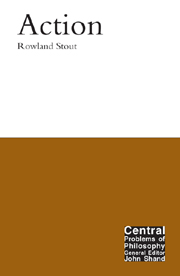Book contents
- Frontmatter
- Contents
- Acknowledgements
- 1 Introduction: inward-looking and outward-looking approaches to agency
- 2 Acting for a reason
- 3 Reasons and passions
- 4 Agent causation
- 5 Mental causation
- 6 Deviant causal chains and causal processes
- 7 Acting with an intention
- 8 Prior intention
- 9 The metaphysics of action
- Conclusion
- Notes
- Suggestions for further reading
- References
- Index
Conclusion
- Frontmatter
- Contents
- Acknowledgements
- 1 Introduction: inward-looking and outward-looking approaches to agency
- 2 Acting for a reason
- 3 Reasons and passions
- 4 Agent causation
- 5 Mental causation
- 6 Deviant causal chains and causal processes
- 7 Acting with an intention
- 8 Prior intention
- 9 The metaphysics of action
- Conclusion
- Notes
- Suggestions for further reading
- References
- Index
Summary
Back in Chapter 1 I introduced a distinction between an inwardlooking and an outward-looking approach to agency and action. In Chapter 2 I described a rationalistic approach to agency according to which what characterizes intentional action is that it is subject to justification. In Chapter 3 I argued that the reasons that figure in the justification of action are generally considerations in the world outside the mind of the agent. This means that the rationalistic approach to agency is still an outward-looking approach.
Then I tried to work out how to characterize the causal aspect of agency. In Chapter 4 I tentatively accepted the principle that when someone acts they make something happen in the world. Combined with the rationalistic approach this means that an action is a causal process of making something happen in the light of certain reasons. Acting is justified causation.
I was not convinced by the agent-causationist claim that someone making something happen should not be understood in terms of some state they are in being causally significant. But I was not convinced either that it should be understood in terms of some internal psychological state being causally significant. I considered various arguments in Chapter 5 against the idea that psychological states do cause the results of action, and found none of them particularly convincing either.
- Type
- Chapter
- Information
- Action , pp. 153 - 154Publisher: Acumen PublishingPrint publication year: 2005



